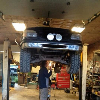Bob H...
Member
- Joined
- April 22, 2017
- Messages
- 14
- Reaction score
- 0
- Location
- Virginia
- City, State
- Centreville, VA
- Year, Model & Trim Level
- 2007 Ford Explorer XLT
Hi everybody!
My 2007 Ford Explorer XLT (6 cyl, 114k miles) often blows fuse #43 when I accelerate hard or medium-hard from a stop -- causing the coil to lose power and the vehicle to stall, often in a busy intersection, which is fun. I can go a few days without blowing a fuse if I accelerate more gently from every stoplight, but I inevitably blow the fuse when I do a more "normal" acceleration. So far I've burned through about 10 fuses in the last 3 months.
#43 is a 15A fuse, found in the fuse box under the hood on the driver's side. Without it the coil has no power.
It takes maybe 3-4 seconds of acceleration before the fuse blows. It might possibly be at the moment when the tranny would be shifting into 2nd gear, but that's just a wild guess.
The problem doesn't seem to occur when the engine is cold. All the blown fuses have occurred after driving at least 10 minutes.
I took the vehicle to a professional shop twice, but they couldn't get the problem to repeat, and they couldn't find any obvious frayed wires, so they gave up.
I replaced the radiator and thermostat housing because they were both leaking badly and I thought the excess water might be the cause of a short. Everything is dry now, but the fuse blowing continues.
A couple days ago I replaced the coil pack, but the problem continues.
The problem started 2 weeks after I did an oil/filter change, but otherwise no work was done in the months before the problem. There haven't been any electrical modifications or customizations to the vehicle.
Anybody have any ideas?
My 2007 Ford Explorer XLT (6 cyl, 114k miles) often blows fuse #43 when I accelerate hard or medium-hard from a stop -- causing the coil to lose power and the vehicle to stall, often in a busy intersection, which is fun. I can go a few days without blowing a fuse if I accelerate more gently from every stoplight, but I inevitably blow the fuse when I do a more "normal" acceleration. So far I've burned through about 10 fuses in the last 3 months.
#43 is a 15A fuse, found in the fuse box under the hood on the driver's side. Without it the coil has no power.
It takes maybe 3-4 seconds of acceleration before the fuse blows. It might possibly be at the moment when the tranny would be shifting into 2nd gear, but that's just a wild guess.
The problem doesn't seem to occur when the engine is cold. All the blown fuses have occurred after driving at least 10 minutes.
I took the vehicle to a professional shop twice, but they couldn't get the problem to repeat, and they couldn't find any obvious frayed wires, so they gave up.
I replaced the radiator and thermostat housing because they were both leaking badly and I thought the excess water might be the cause of a short. Everything is dry now, but the fuse blowing continues.
A couple days ago I replaced the coil pack, but the problem continues.
The problem started 2 weeks after I did an oil/filter change, but otherwise no work was done in the months before the problem. There haven't been any electrical modifications or customizations to the vehicle.
Anybody have any ideas?










